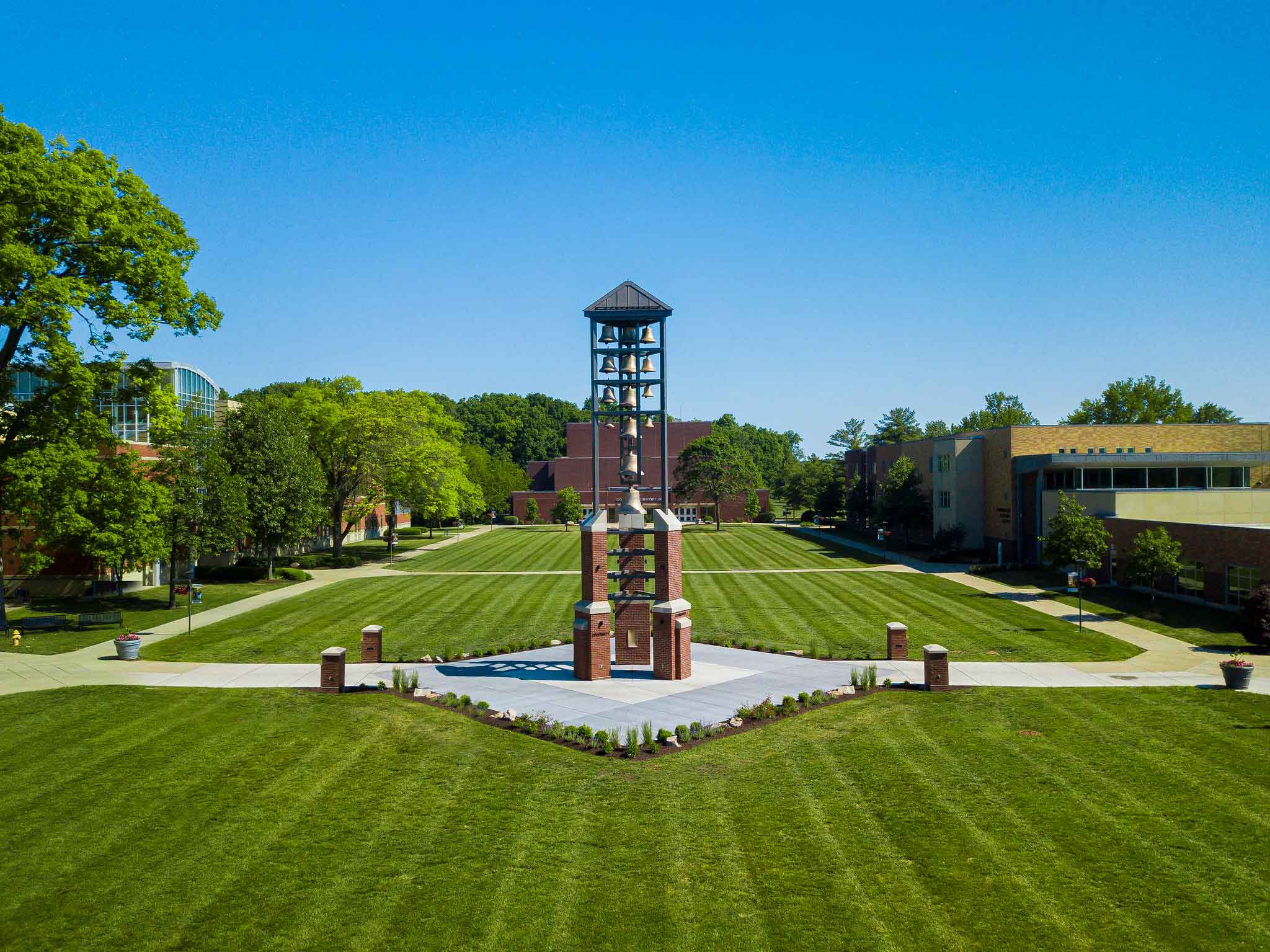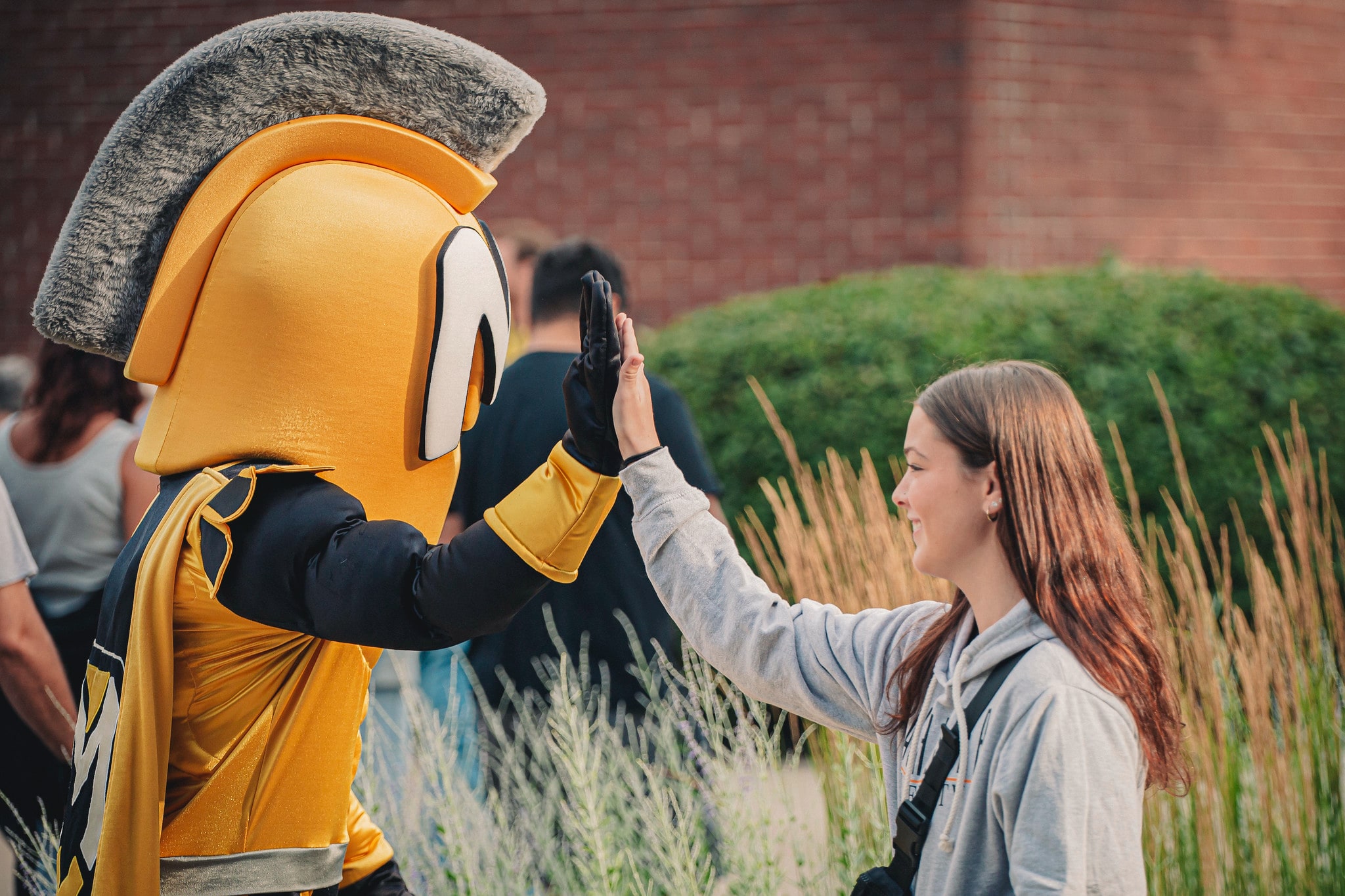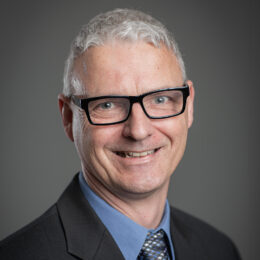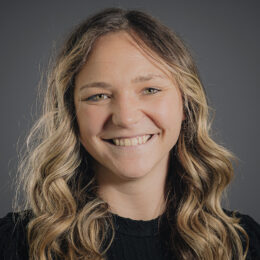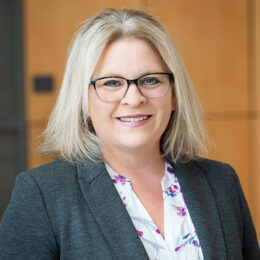Pre-Physical Therapy
Manchester’s Pre-Physical Therapy program prepares you to become a highly skilled healthcare professional. Gain hands-on experience, build essential knowledge in human movement and rehabilitation, and receive expert guidance as you pursue your BS in Clinical and Rehabilitation Sciences—positioning you for success in competitive Doctor of Physical Therapy programs.

Explore the Pre-Physical Therapy Track at Manchester University
At Manchester University, our Pre-Physical Therapy program lays the foundation for a fulfilling and impactful career in physical therapy. As part of the Clinical and Rehabilitation Sciences major, this academic track offers rigorous coursework in anatomy, physiology, kinesiology, and rehabilitation sciences. You’ll build essential clinical knowledge while gaining hands-on experience that prepares you for the challenges of graduate study and future patient care. Designed to align with the entry requirements for Doctor of Physical Therapy (DPT) programs—including Manchester’s own—this program ensures you’re ready for next steps academically and professionally. Whether your goal is to help others recover from injury, improve mobility, or manage chronic conditions, you’ll graduate ready to make a difference as a future healthcare provider.
Program Information:
Major | Applied BS
- 57 Credit Hours
Location
- North Manchester

Thomas Ruediger, DPT DSc
Doctor of Physical Therapy Program Director
How to Get Into Physical Therapy School
Why Choose MU for Pre-Physical Therapy?

High Graduate School Acceptance Rates
Immersive Hands-On Learning
State-of-the-Art Facilities
Expert Faculty Support
What You Can Do with Your Pre-Physical Therapy Degree
Manchester University’s Pre-Physical Therapy Program is your gateway to a multitude of academic and professional opportunities as a health care professional. Graduates of the program are encouraged to continue their education in our Doctor of Physical Therapy (DPT), which provides sought-after skills and experience for a wide range of opportunities in areas such as:
Licensed Physical Therapist
Diagnose and treat patients in clinical and outpatient healthcare settings
Rehabilitation Specialist
Support recovery in hospitals, nursing homes, and senior care facilities.
Clinical Researcher
Contribute to advancements in therapies through scientific study and analysis.
Sports Medicine Consultant
Advise athletes and teams on injury prevention and physical recovery.
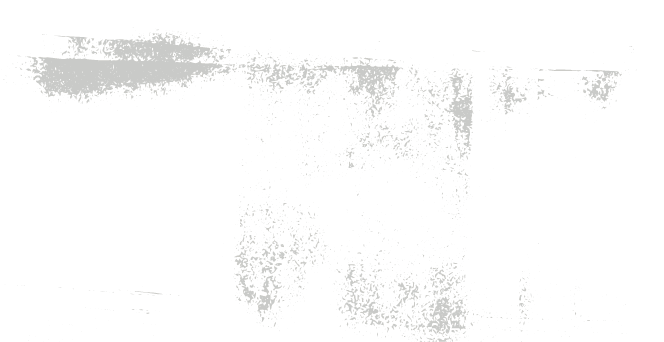
Average Starting Salary for Pre-Physical Therapy Graduates
Graduates who go on to earn a Doctor of Physical Therapy (DPT) degree enjoy strong job prospects and competitive salaries. According to the U.S. Bureau of Labor Statistics, the median annual salary for physical therapists was $97,720 in 2022, with the top 10 percent earning more than $142,730. Salaries vary by setting, location, and specialization—those working in hospitals or outpatient clinics often earn more. Demand continues to rise, making physical therapy a stable and rewarding career path.
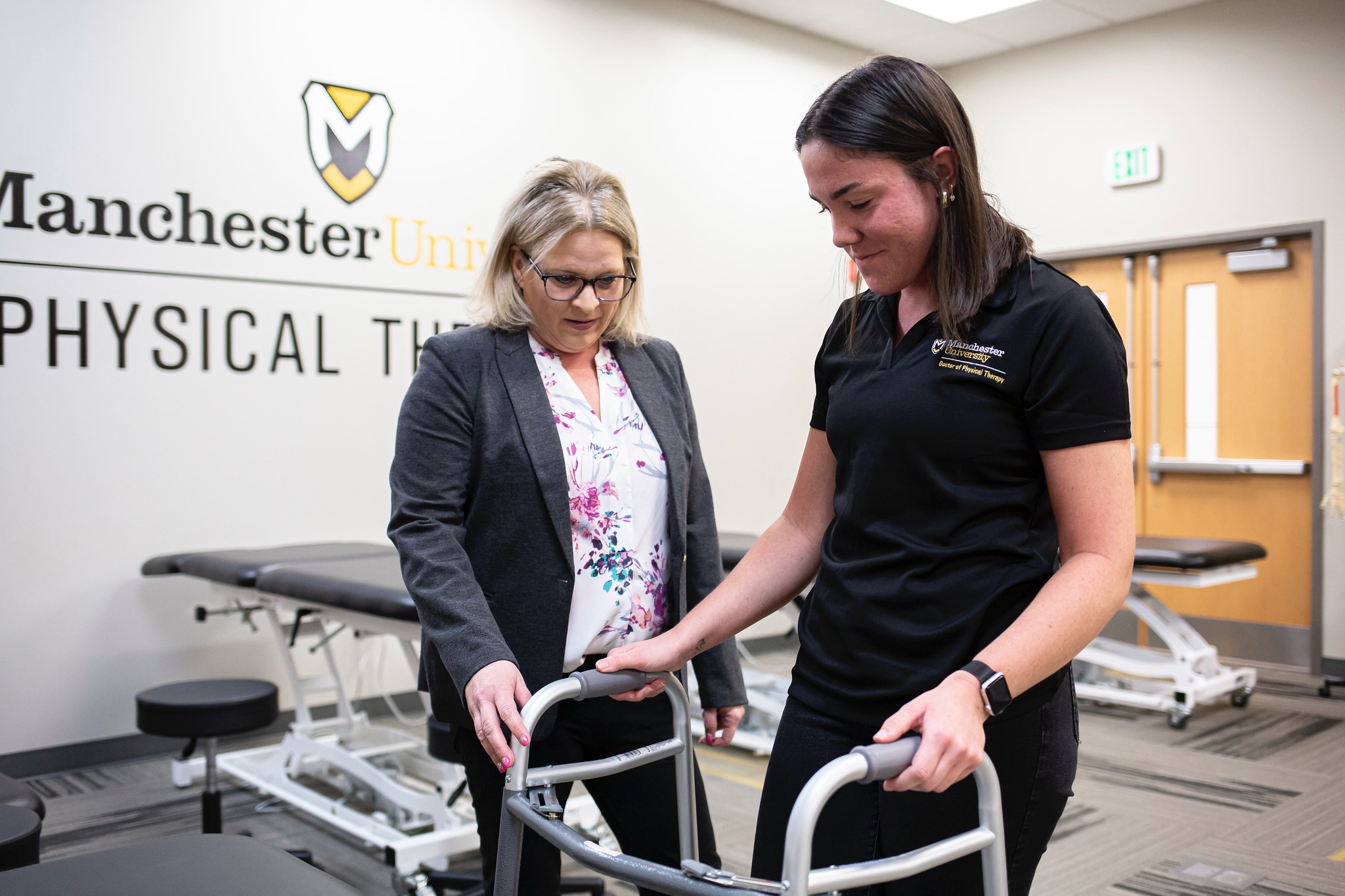
How the Pre-Physical Therapy Program Supports Your Growth
What Does “Applied” Pre-Physical Therapy Mean?
An applied degree is a focused, career-oriented bachelor’s degree that requires 90 credit hours instead of the traditional 120. It emphasizes practical, real-world skills over general education electives, preparing students to enter the workforce or attend graduate school sooner.
Students benefit by saving time and money—often graduating a year earlier and with significantly lower tuition costs.
Pre-Physical Therapy Courses and Curriculum
Manchester University’s Pre-Physical Therapy curriculum offers a science-rich, clinically grounded path toward graduate study in physical therapy. With a clear academic progression and 65+ total credits, students gain the foundational knowledge and applied experience needed for DPT program readiness.
Example Courses:
Introduction to Rehabilitation Sciences, Medical Terminology, Human Nutrition, Principles of Biology I & II with Lab, Human Anatomy with Lab, Human Physiology with Lab, Developmental Psychology, Orthopedic Evaluation, Exercise Physiology with Lab, Orthopedic Intervention, Administration of Health & Physical Activity Programs, Internship
Total Credits for Pre-PT Curriculum: 65+
Graduates leave Manchester with strong preparation in movement science, clinical problem-solving, and patient-centered care—ready to thrive in Doctor of Physical Therapy (DPT) programs.
Learning Outcomes: Human Performance and Exercise Science
Students in the Pre-Physical Therapy concentration gain a deep understanding of human performance and movement science, preparing them to work effectively with diverse populations in health and fitness settings.
Scientific Foundations and Key Concepts
You’ll master essential terminology, facts, and principles related to exercise science, including general physical preparedness, nutrition, strength and conditioning, and strategies to enhance athletic performance.
Applied Human Movement and Program Design
Learn how to apply principles of anatomy, physiology, and biomechanics to design safe and effective training programs. You’ll analyze movement to identify pre-existing conditions and optimize performance.
Behavioral Strategies for Health and Performance
Understand how to create and adapt health and fitness plans that support behavioral change. Coursework covers mental health, general wellness, and personalized goal setting for physical outcomes.
Research and Professional Communication
Develop critical thinking by engaging in scientific research and academic discussions. You’ll conduct interviews, interpret data, and synthesize relevant findings—building expertise that contributes to the broader health sciences field.
These learning outcomes ensure you’re prepared not only for physical therapy school, but also for a lifetime of evidence-based practice in health, fitness, and rehabilitation.
Student Groups and Campus Involvement
At Manchester University, Pre-Physical Therapy students are encouraged to enhance their academic experience through active participation in campus life. You’ll find a supportive community and numerous opportunities to grow outside the classroom.
Health & Science Student Organizations
Join student-led groups focused on healthcare, rehabilitation, and physical performance. These organizations often host guest speakers, service projects, and events that connect students with healthcare professionals and alumni.
Professional Development Opportunities
Take advantage of leadership roles, peer collaboration, and volunteer work that strengthens your graduate school applications and prepares you for team-based clinical settings.
Community Engagement
Many students participate in local health fairs, wellness education efforts, and outreach initiatives—putting classroom knowledge into real-world practice while giving back to the community.
Pathway to Manchester’s Doctor of Physical Therapy Program
Manchester’s Pre-Physical Therapy program is more than just preparation—it’s a launchpad. In addition to fulfilling undergraduate prerequisites for most DPT programs nationwide, this pathway gives you a competitive edge when applying to Manchester’s own Doctor of Physical Therapy (DPT) Program.
You’ll benefit from:
- Early exposure to graduate-level expectations
- Guidance from DPT faculty and advisors
- Opportunities for early assurance or streamlined admissions
With focused preparation and integrated advising, you’ll be positioned for success in the next phase of your healthcare journey.
Meet the Faculty
You Might Also Be Interested In These Programs
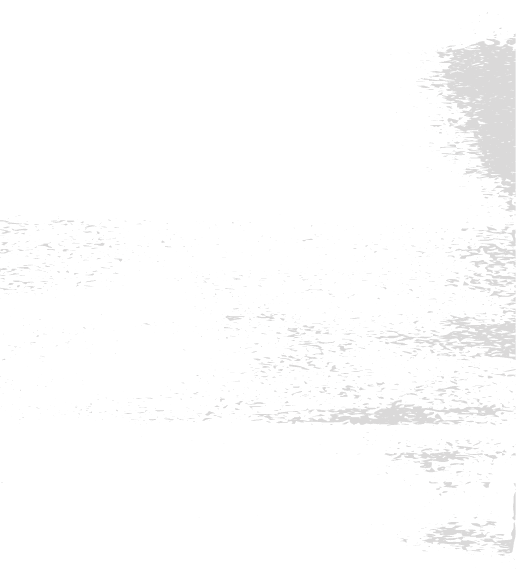
FAQs About the Pre-Physical Therapy Program
What is the Pre‑Physical Therapy program at Manchester University?
Manchester University’s Pre‑Physical Therapy program is a concentration within the Bachelor of Science in Clinical & Rehabilitation Sciences. This rigorous academic pathway is part of the university’s pre-professional programs and is designed to prepare students interested in becoming PTs for success in graduate programs—especially Doctor of Physical Therapy (DPT) programs.
The curriculum integrates essential prerequisite courses such as human anatomy, physiology, orthopedic evaluation, medical terminology, developmental psychology, exercise science, chemistry, and data analytics. With a 65+ credit hour core, the program blends classroom theory with experiential learning, including lab-based courses and a supervised clinical internship. Pre‑physical therapy students gain valuable knowledge in human movement, rehabilitation principles, and clinical practices.
Whether you’re planning to enter the physical therapy profession or want a flexible foundation in health sciences, this program prepares students for the academic and technical demands of graduate-level healthcare education. Many graduates go on to complete a DPT program and become licensed physical therapists. The program also supports professional development through mentorship, advising, and research opportunities, helping students transition seamlessly from undergraduate study to advanced professional programs.
How does Manchester’s Pre‑Physical Therapy concentration prepare me for DPT programs?
Manchester’s Pre‑Physical Therapy concentration offers a carefully structured curriculum that fulfills the prerequisite courses needed for most Doctor of Physical Therapy programs. This includes comprehensive coverage of the sciences—biology, chemistry, anatomy, and physiology—paired with hands-on clinical instruction in orthopedic evaluation, statistical analysis, and therapeutic intervention. Coursework is designed to prepare students for both the academic rigors and real-world application required in the physical therapy profession.
Students also benefit from Manchester’s strong academic advising. Faculty members and clinical professors offer personal mentorship to ensure students are on track with course sequencing, GPA requirements, and clinical experience. From introductory courses to upper-level labs, every step is aligned to help students meet the criteria for graduate program admission. Additionally, the program emphasizes professionalism, critical thinking, and patient care readiness.
Manchester’s Pre‑Physical Therapy program is ideal for students interested in applying to DPT programs through PTCAS or other admissions portals. With early exposure to graduate-level concepts, internship placements, and guidance on certification requirements, the program fully equips students for the next phase of their physical therapy education and eventual licensure as healthcare providers.
What hands-on experiences are included in the Pre‑Physical Therapy program?
Hands-on learning is a cornerstone of Manchester University’s Pre‑Physical Therapy program. From the first year, students participate in lab-based science courses like Human Anatomy, Human Physiology, and Exercise Physiology—gaining essential clinical knowledge and practical skills. These labs are supported by small class sizes and access to state-of-the-art facilities, ensuring students receive personalized attention and real-time application of theoretical concepts.
In upper-level coursework, students take classes like Orthopedic Evaluation and Orthopedic Intervention, where they learn how to assess injury, design rehabilitation programs, and apply therapeutic modalities. Students also complete an internship—often in hospitals, outpatient clinics, or sports medicine environments—where they interact directly with patients, perform supervised assessments, and observe licensed physical therapists at work.
These immersive experiences prepare students for the physical therapy profession by emphasizing critical thinking, patient care, and interdisciplinary collaboration. Graduates leave with the skills to succeed in DPT programs and eventually work in diverse clinical settings, such as skilled nursing facilities, rehabilitation hospitals, or private practices. The program bridges the gap between classroom education and clinical competence, setting the stage for advanced study and long-term professional success.
What career paths can I pursue after completing the Pre‑Physical Therapy program?
Graduates of Manchester University’s Pre‑Physical Therapy program typically pursue a Doctor of Physical Therapy (DPT) degree, which opens the door to licensed clinical practice. Once certified, physical therapists can work in a variety of settings, including hospitals, rehabilitation centers, skilled nursing facilities, outpatient clinics, and home health services. Their responsibilities include diagnosing and treating patients with mobility issues, developing treatment plans, and improving patient quality of life.
Beyond direct patient care, physical therapy graduates may enter roles in academia, clinical research, or healthcare leadership. Others use their foundational knowledge in exercise science and health sciences to work in sports medicine, government health services, or with professional athletic teams as consultants. The bachelor’s degree concentration also supports entry into related fields such as occupational therapy, physician assistant programs, or public health initiatives.
With growing demand for professionals in the physical therapy profession, students who complete this pre‑physical therapy program are well-positioned to succeed in graduate programs and thrive in diverse healthcare environments. The program’s focus on applied learning, prerequisite course mastery, and career readiness ensures each student has multiple pathways to professional fulfillment.
What support services are available to Pre‑Physical Therapy students?
Manchester University offers a comprehensive support network to help pre‑physical therapy students thrive academically and professionally. From the moment students begin their bachelor’s degree in Clinical & Rehabilitation Sciences, they are paired with experienced academic advisors and clinical faculty who guide them through prerequisite courses, credit planning, and graduate school preparation.
Faculty mentorship is a major component of the program. Professors help students identify research opportunities, prepare graduate school applications, and explore different specializations within the physical therapy profession. Dedicated career services assist students in building résumés, practicing for interviews, and refining their personal statements for DPT program applications.
Additionally, students benefit from campus-wide academic support services, including tutoring, writing centers, and leadership workshops. Manchester also hosts healthcare-related student organizations that offer peer networking, volunteering opportunities, and exposure to visiting professionals. These student groups allow pre‑physical therapy students to grow their professional network, explore various career paths, and build confidence in healthcare settings.
Together, these support services prepare students to meet the demands of physical therapy education, excel in clinical practice, and transition confidently into graduate and professional programs.
How do I get started and apply to the Pre‑Physical Therapy concentration?
The standard application includes submission of academic transcripts, a completed application form, and any relevant test scores. While not required, completing high school coursework in biology, chemistry, and physics is highly recommended for success in this science-based professional program.
Once accepted to the university, students formally declare the Pre‑Physical Therapy concentration in consultation with an academic advisor. From there, a customized academic plan is developed, including prerequisite courses and optional electives such as behavior disorders or general biology. To remain in good standing, students must meet GPA standards (typically 2.5 or higher) and earn a grade of C or better in core science classes like Anatomy, Physiology, and Orthopedic Evaluation.
Throughout their time in the program, students work closely with faculty to meet application requirements for DPT programs, such as the PTCAS application. The university also offers resources for preparing for the GRE and organizing observation hours. Whether you’re just starting your college journey or transferring from another institution, Manchester’s pre-professional programs make it easy to begin preparing for a career in the physical therapy profession.
Pre-Physical Therapy Learning Outcomes
Program Learning Outcomes
1. Students will demonstrate knowledge and understanding of the scientific terminology, facts, principles, laws, and concepts of exercise as appropriate for an entry-level health/fitness professional.
Student Learning Outcomes:
- Students will identify and master key concepts and principles of human performance (eg: General Physical Preparedness, General Fitness Markers, Nutrition, Strength and Conditioning, and enhancing Athletic Performance).
2. Students will apply fundamental human movement principles in the areas of anatomy, physiology, and biomechanics to a variety of exercise/fitness contexts and populations in order to design safe and effective training programs for a multitude of populations.
Student Learning Outcomes:
- Students will analyze functional movement to identify pre-existing conditions in human movement and how to best navigate limiting factors and optimize performance.
- Students will evaluate and create safe and effective exercise and fitness programs for a multitude of athlete/client populations.
3. Students will demonstrate the knowledge of behavior strategies to enhance fitness and health behavior changes, specifically in the areas of general health, nutrition, mental health, and athletic performance.
Student Learning Outcomes:
- Students will understand components of health and fitness plans in order to accommodate client and drive specific physical adaptations/goals.
4. Students will evaluate scientific literature to synthesize relevant information in exercise/fitness to be subject matter experts and contributing members of the field.
Student Learning Outcomes:
- Students will conduct research, interviews, and engage in academic discourse to showcase their mastery of the content and ability to contribute to the field.
Non-Discrimination in the Admission Process
Manchester University is committed to non-discrimination in campus life. The University does not discriminate on the basis of national origin, ancestry, race, color, age, sex, gender identity or expression, sexual orientation, familial status, religion, disability or veteran status in admissions or any area of campus life, including its educational programs, scholarships and loan awards, residence life programs, athletic programs, extracurricular programs, promotion and tenure policies and practice, and alumni affairs.
Manchester University is committed to carry out the provisions of Section 504 of the Rehabilitation Act of 1973 and the Americans With Disabilities Act, which provide for accessibility of University programs to the physically disabled.

